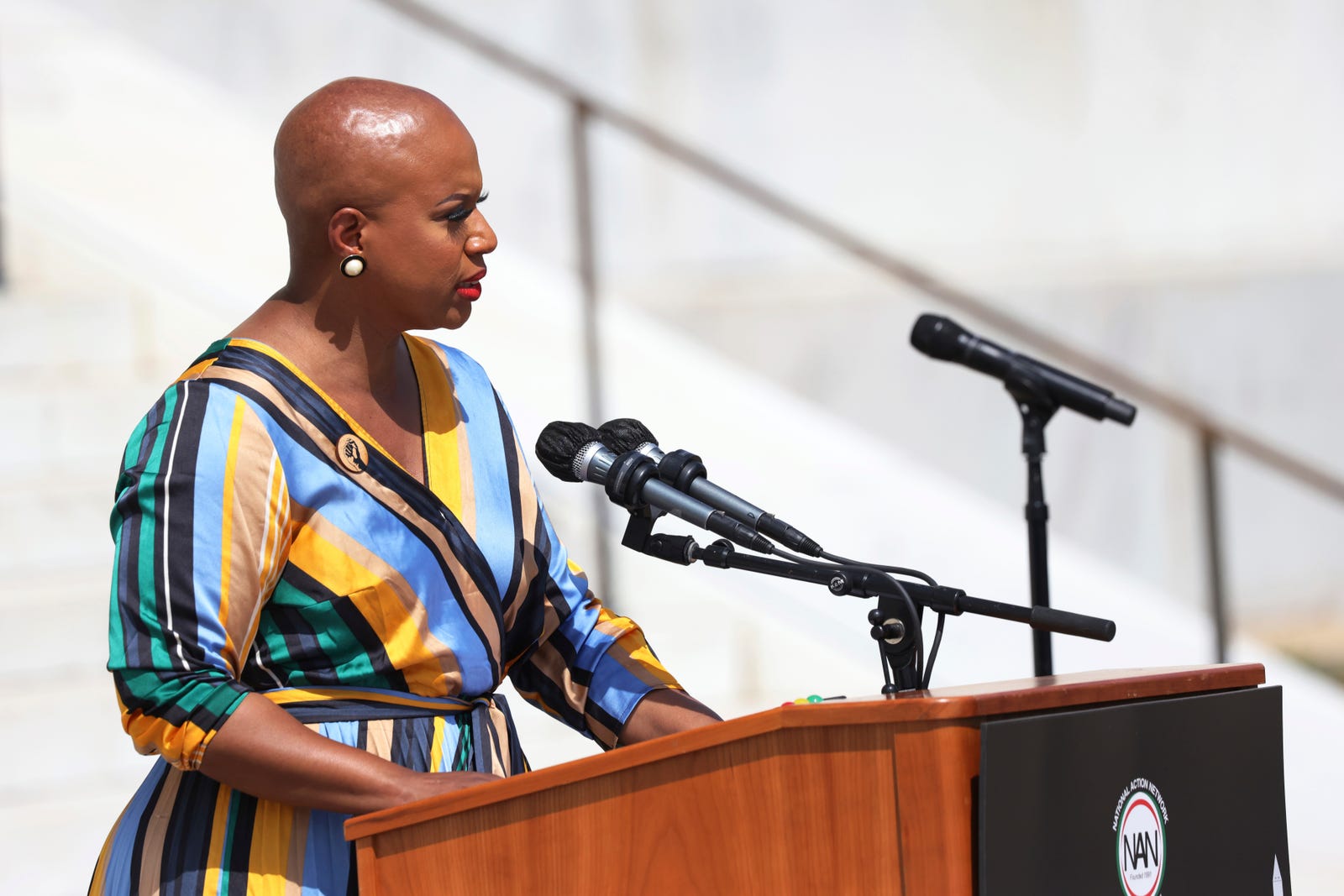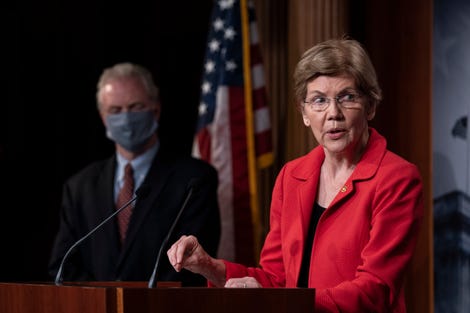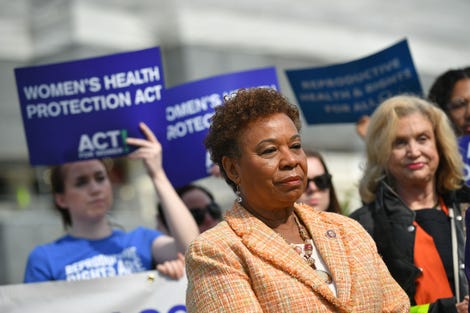Madam president
 Exclusive: Sen. Elizabeth Warren and Reps. Ayanna Pressley, Barbara Lee Unveil Historic Legislation Confronting Public Health Impact of Structural Racism
Anne Branigin
Photo: Michael M. Santiago (AP)
Exclusive: Sen. Elizabeth Warren and Reps. Ayanna Pressley, Barbara Lee Unveil Historic Legislation Confronting Public Health Impact of Structural Racism
Anne Branigin
Photo: Michael M. Santiago (AP)
Sen. Elizabeth Warren (D-Mass.) and Reps. Ayanna Pressley (D-Mass.) and Barbara Lee (D-Calif.) announced on Thursday a new plan that would declare racism a public health issue. Dubbed “the Anti-Racism in Public Health Act of 2020,” the legislation is the first of its kind and would harness the power of the Centers for Disease Control and Prevention to research health disparities and propose antiracist policies to eradicate racial divides in health outcomes.
The bill also builds upon a growing movement among state and local governments that have declared racism a public health crisis in order to shore up funding, increase accountability, and push through bold new proposals to dismantle the deep inequalities laid bare by the coronavirus pandemic and violent policing.
“It is time we start treating structural racism like we would treat any other public health problem or disease: investing in research into its symptoms and causes and finding ways to mitigate its effects,” said Sen. Warren. “My bill with Representatives Lee and Pressley is a first step to create anti-racist federal health policy that studies and addresses disparities in health outcomes at their roots.”
Congresswoman Pressley echoed the sentiments, telling
The Root, “For far too long, our federal government has failed to recognize and address the structural racism that has devastated Black and brown communities and denied access to quality health care.”
“We must have a coordinated public health response to structural racism, and this bill would do just that.”
Photo: Drew Angerer (Getty Images)
The bicameral legislation comes at the tail-end of a summer that has been defined by three major crises: the coronavirus pandemic, which has thus far killed more than 180,000 Americans; state and vigilante violence targeting Black Americans, sparking insurrections across the United States; and the
worst job losses the country has ever experienced. In each instance, race has been a defining feature.
Data from around the country have shown disproportionately high rates of infection and death from COVID-19 among Latinx and Black communities. In May, the
Navajo Nation had the highest infection and death rate per capita than any of the 50 states. Among public health experts and epidemiologists, there has been widespread agreement that the causes of these disparities are rooted in structural problems, not personal choices. Government policies like redlining and racial covenants, for instance, have helped perpetuate decades of divestment, ensuring predominantly Black, Latinx and Native communities are
more likely to be polluted, have less access to adequate health care and fewer educational resources and job opportunities. Even before data on COVID-19’s racial disparities were known, public health experts and environmental justice advocates
warned that the disease was likely to have a disproportionate impact on communities of color.
But despite nationwide shelter-in-place directives,
the rate of police killings has been on par with years prior. An onslaught of high profile cases of police brutality and vigilante violence targeting Black people, including the deaths of George Floyd, Breonna Taylor, Ahmaud Arbery, and the recent shooting of Jacob Blake, have spurred the largest racial justice movement in the country’s history.
In the background, an economic crisis triggered by the pandemic has created
massive job losses and triggered evictions; those too, have devastated
Black and Latinx households at higher rates. And with no end in sight to this current recession, it’s still unclear what long-term effects this economic downturn may have on these communities.
“COVID-19 has exposed the injustices in health outcomes for Black and Brown people, and it’s no coincidence,” said Rep. Barbara Lee. “In addition to addressing the lasting impacts of systemic racism in criminal justice, economic inequality and the like, we must also commit resources to understanding racially unjust health outcomes.”
The bill put forward by Warren, Lee and Pressley calls for the CDC to establish a National Center on Antiracism and Health that would formally declare racism a public health crisis; conduct research and collect data on the public health impacts of systemic racism, as well educate the public on its findings; and evaluate effective policies and practices that improve health outcomes for communities of color. The legislation also aims at improving cooperation between the federal government and Native communities, requiring increased communication and coordination between the CDC and Tribal communities and councils.
But perhaps most notable is the creation of a new program within the CDC that would specifically look at the public health impact of police brutality and violence. The “Law Enforcement Violence Prevention Program” would study the impact police brutality has on various communities, collect comprehensive data on state violence and its effects, and work on developing public health interventions to eliminate the “deaths, injury, trauma, and negative mental health effects from police presence and interactions.”
“Racial and ethnic inequity in public health is a result of systematic, personally mediated, and internalized racism and racist public and private policies and practices, and dismantling structural racism is integral to addressing public health,” the bill states.
US Representative Barbara Lee attends a press conference on the reintroduction of the “Women’s Health Protection Act at the House Triangle of the US Capitol in Washington, DC, on May 23, 2019.
Photo: MANDEL NGAN (Getty Images)
Rep. Pressley added that the legislation would require the federal government to proactively develop anti-racist policies.
“It is time we recognize and treat structural racism and police brutality as the public health crises that they are,” she said.
The idea of addressing structural racism as a public health issue has gained a lot of ground in recent months. Milwaukee County—just 32 miles away from Kenosha County—was among the first to
declare racism a public health crisis in 2019, citing deep racial divides in employment, education and incarceration rates. Since then, roughly 60 state and local governments have followed suit. As Sharrelle Barber, a Drexel University assistant professor of epidemiology, explained to the
Smithsonian this summer, this approach shifts the way institutions and medical professionals confront health problems like obesity, maternal mortality, and diabetes (all of which have a disproportionate effect on African Americans). Rather than addressing these issues as the product of personal choices or biology, the causes of these disparities are tackled at their roots. And with research showing “
a deadly barrage” of new pandemics to come, the urgency to eradicate systemic inequality as a matter of public health has arguably never been more urgent.
“If we had a structural racism lens going into this pandemic, perhaps we would have done things differently. For example, get testing to communities that we know are going to be more susceptible to the virus,” Barber told the Smithsonian. “We would have done that early on as opposed to waiting, or we would have said, ‘Well, folks need to have personal protective equipment and paid sick leave and hazard pay.’ We would have made that a priority.”
Sens. Mazie Hirono (D-Hawaii.), Edward J. Markey (D-Mass.), Jeff Merkley (D-Ore.), and Tina Smith (D-Minn.) are all cosponsors of the Senate bill. The legislation has also been endorsed by the NAACP, the National Medical Association, the National Urban League, the Center for Reproductive Rights and the Justice Collaborative, among others.
Dr. Joia Crear Perry, founder and president of the National Birth Equity Collaborative, is among those supporting the historic bill.
“Right now, health and life outcomes are largely dictated by the color of one’s skin,” said Perry. “Absent sweeping change, Black people’s lives will continue to be disregarded.”
















